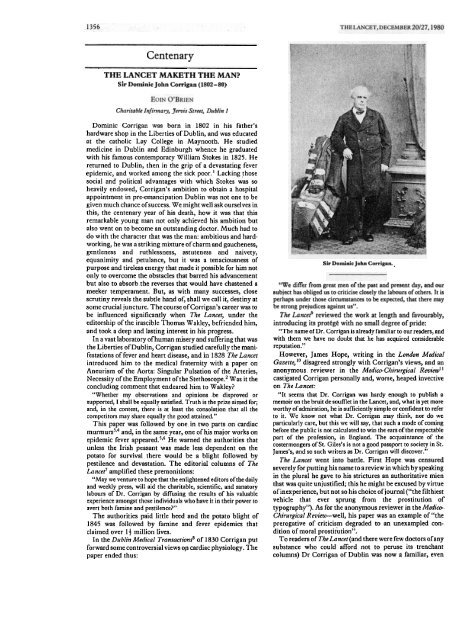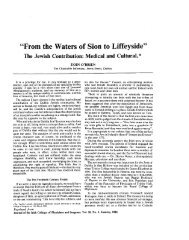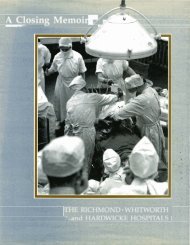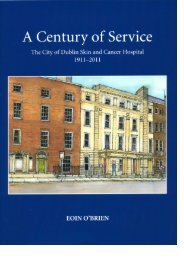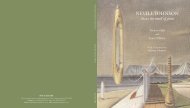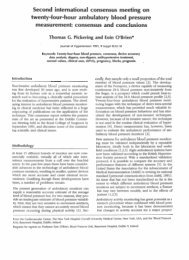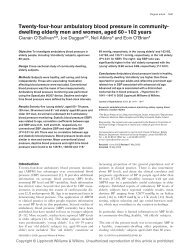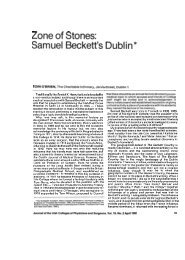You also want an ePaper? Increase the reach of your titles
YUMPU automatically turns print PDFs into web optimized ePapers that Google loves.
Centenary<br />
~ ~p<br />
THE LANCET MAKETH THE MAN?<br />
Sir Dominic John Corrigan (1802-80)<br />
Charirable Infirmary, 'jervis Srreet, Dublin I<br />
Dominic Corrigan was born in 1802 in his father's<br />
hardware shop in the Liberties of Dublin, and was educated<br />
at the catholic Lay College in Maynooth. He studied<br />
medicine in Dublin and Edinburgh whence he graduated<br />
with his famous contemporary William Stokes in 1825. He<br />
returned to Dublin, then in the grip of a devastating fever<br />
epidemic, arid worked aniong the sick poor.' Lacking those<br />
social and political advantages with which Stokes was so<br />
heavily endowed, Corrigan's ambition to obtain a hospital<br />
appointment in pre-emancipation Dublin was not one to be<br />
given much chance ofsuccess. We might well ask ourselves in<br />
this, the centenary year of his death, how it was that this<br />
remarkable young man not only achieved his ambition but<br />
also went on to become an outstanding doctor. Much had to<br />
do with the character that was the man: ambitious and hardworking,<br />
he was a striking mixture of charm and gaucheness,<br />
gentleness and ruthlessness, astuteness and naivety,<br />
equanimity and petulance, but it was a tenaciousness of<br />
purpose and tireless energy that made it possible for him not<br />
only to overcome the obstacles that barred his advancement<br />
but also to absorb the reverses that would have chastened a<br />
meeker temperament. But, as with many successes, close<br />
scrutiny reveals the subtle hand of, shall we call it, destiny at<br />
some crucial juncture. The course of Corrigan's career was to<br />
be influenced significantly when The <strong>Lancet</strong>, under the<br />
editorship of the irascible Thomas Wakley, befriended him,<br />
and took a deep and lasting interest in his progress.<br />
In a vast laboratory ofhuman misery and suffering that was<br />
the Liberties of Dublin, Corrigan studied carefully the manifestations<br />
of fever and heart disease, and in 1828 The <strong>Lancet</strong><br />
introduced him to the medical fraternity with a paper on<br />
Aneurism of the Aorta: Sinmlar Pulsation of the Arteries.<br />
Necessity of the ~m~lo~men; ofthe Stethoscope.' Was it th;<br />
concluding comment that endeared him to Wakley?<br />
"Whether my observations and opinions .be disproved or<br />
supported, I shall be equally satisfied. Truth is the prize aimed for;<br />
and, in the contest, there is at least the consolation that all the<br />
competitors may share equally the good attained."<br />
This paper was followed by one in two parts on cardiac<br />
murmur^^.^ and, in the same year, one of his major works on<br />
epidemic fever a~peared.~?~ He warned the authorities that<br />
unless the Irish peasant was made less dependent on the<br />
potato for survival there would be a blight followed by<br />
pestilence and devastation. The editorial columns of The<br />
<strong>Lancet</strong>7 amplified these premonitions:<br />
"May we venture to hope that the enlightened editors of the daily<br />
and weekly press, will aid the charitable, scientific, and sanatory<br />
labours of Dr. Corrigan by difrusing the results of his valuable<br />
experience amongst those individuals who have it in their power to<br />
avert both famine and pestilence?"<br />
The authorities paid little heed and the potato blight of<br />
1845 was followed by famine and fever epidemics that<br />
claimed over I+ million lives.<br />
In the Dublin Medical Transacrions8 of 1830 Corrigan put<br />
forward some controversial views op cardiac physiology. The<br />
paper ended thus:<br />
Sir Dominic John Corrigan.,<br />
"We differ from great men of the past and present day, and our<br />
subject has obliged us to criticise closely the labours of others. It is<br />
perhaps under those circumstances to be expected, that there may<br />
be strong prejudices against us".<br />
The <strong>Lancet</strong>9 reviewed the work .at length and favourably,<br />
introducing its protege with no small degree of pride:<br />
"The name of Dr. Corrigan is already familiar to our readers, and<br />
with them we have no doubt that he has acquired considerable<br />
reputation."<br />
However, James Hope, writing in the London Medical<br />
Gazette,'' disagreed strongly with Corrigan's views, and an<br />
anonymous reviewer in the Medico-ChirurgicaI Review"<br />
castigated Corrigan personally and, worse, heaped invective<br />
on The Lancer:<br />
"It seems that Dr. Corrigan was hardy enough to publish a<br />
memoir on the bruit de soufflet in the <strong>Lancet</strong>, and, what is yet more<br />
worthy of admiration, he is sufficiently simple or confident to refer<br />
to it. We know not what Dr. Corrigan may think, nor do we<br />
particularly care, but this we will say, that such a mode of coming<br />
before the public is not calculated to win the ears of the respectable<br />
part of the profession, in England. The acquaintance of the<br />
costermongers of St. Giles's is not a good passport to society in St.<br />
James's, and so such writers as Dr. Corrigan will discover."<br />
The Lancer went into battle. First Hope was censured<br />
severely for putting his name to a review in which by speaking<br />
in the plural he gave to his strictures an authoritative mien<br />
that was quite unjustified; this he might be excused by virtue<br />
of inexperience, but not so his choice of journal ("the filthiest<br />
vehicle that ever sprung from the prostitution of<br />
typography"). As for the anonymous reviewer in the Medic*<br />
Chirurgical Review-well, his paper was an example of "the<br />
prerogative of criticism degraded to an unexampled con-<br />
dition bf moral prostitution".<br />
To readers of The <strong>Lancet</strong> (and there were few doctors ofany<br />
substance who could afford not to peruse its trenchant<br />
columns) Dr Corrigan of Dublin was now a familiar, even
TllE LANCET, DECEMBER 20127,<strong>1980</strong><br />
colourful, medical personality. When he applied for the post<br />
of physician to the Charitable Infirmary in Jervis Street, he<br />
was successful in the face ofstrong competition and no doubt<br />
he attributed much ofthe success for this, the most significant<br />
step in his whole career, to the papers The <strong>Lancet</strong> had<br />
published and the attention it had focused on his work.<br />
Corrigan published only oneother paper in The L~ncet.'~<br />
He gave his most famous paper on aortic regurgitation to the<br />
journal of his alma mater." However, he returned to The<br />
Lancer again during the great famine which he had predicted<br />
back in 1829. Ironically protege and mentor, though at one in<br />
ideal, were at variance on an important issue. Corrigan, as a<br />
member of the Government appointed Central Board of<br />
I-lealth, had been party to what was regarded as a derisory<br />
five-shilling-a-day award to doctors working in the famine<br />
areas. However, much of the profession's anger was caused<br />
by the Government's failure to consult with the Royal<br />
Colleges, and Corrigan, who was not a member of any<br />
college, was a most appropriate target for its opprobrium.<br />
Unwisely he selected this moment to seek honorary<br />
fellowship of the Kings and Queens College of Physicians,<br />
and his determination to achieve his aim did not appeal to The<br />
lance^,'^ which, moreover, anticipated that his election<br />
would be misinterpreted by the public as the profession's<br />
approval of the five-shilling-a-day award:<br />
"Sir IIenry Marsh, in his turn goes to the College andseconds the<br />
nomination of Dr. Corrigan . . . while the whipper-in of the<br />
college, who is one of the pllysicians to the Lord-Lieutenant,<br />
appears to be employing all his leisure hours in influencing, by<br />
threat or promise, those members of the corporation who are tw<br />
poor or too dependent to resist. Moreover, so important is this step<br />
considered, that, as the corporation is very small, men are about to<br />
be brought from England and their expenses paid, in order to vote<br />
for this job . . ."<br />
Corrigan was black-beaned, an ignominious redress that<br />
hurt himdeeply, but not for too long. He entered the College<br />
as a licentiate, became its president on five occasions-a feat<br />
not since equalled-and built for it that which it had hitherto<br />
lacked, a college hall. The Government.showed its appre-<br />
ciation for his service by making him physician-in-ordinary to<br />
Queen Victoria, and later a baronet of the Empire.<br />
When Corrigan died in his 79th year he had achieved a<br />
reputation and eminence as a catholic Irishman,<br />
humanitarian, physician, and parliamentarian that was<br />
remarkable in the Ireland of his time.<br />
The Jorirnal o/ the Irish ColIeges of Physicians and Srirgeons has devoted a<br />
special issue (vol. X, <strong>1980</strong>, no. 1, edited by,E. <strong>O'Brien</strong>) to the Corrigan<br />
centenary.<br />
REFERENCES<br />
I. <strong>O'Brien</strong> E. Sir Dominic Corrigan (1802-1880). J Irish Coll Phyans Surj <strong>1980</strong>; 10:<br />
11-19.<br />
2. Cwrign DI: Aneurism ofthe aorta: Sinplar pulsationdtheartcria, ncmsity ofthe<br />
cmnlovment . , ofthc atcrhoscom. lanrn 1829: i: 586-90.<br />
3. Corrigan DJ. Inquiry intothenuscs orbruit dcsou~et"and"hcmis~mcnt cataire".<br />
Lanrrr 1829; ii: 1-5.<br />
4. Corrigan Dl. Inquiry intothccauxsof"bruitdeswmet"snd "fremisscmcntcataire".<br />
1,nnrrr 18.29; ii: 31-35.<br />
5. Corrigan DJ. On the cpidcn~ic fcvcr of Ireland. Luncrr 1829; ii: 569-75.<br />
6. Carrigan DJ. On the epidemic fever oflrelsnd. Lowr 182% ii: 601-05.<br />
7. Editorial. I.anrrr 1829; ii: 614.<br />
8. Corrigan DJ. On the motions and rounds ofthe heart. Dublin Mcd Tram 1830; 1:<br />
151-203.<br />
9. Anon. Onthe motionsandsoundsofthe heart by DrCnrigsn. Lanm 18W; ii:964-71.<br />
10. Hone I. Stricturn on an eisav bv Dr Corrizanon the motionsand soundsofthe heart.<br />
i.ondnn Aird Goz 1830; 6:'680-~7.<br />
I I. Anon. On the motions and sounds olthe heart, by D J Corrigan, MD. Mrd-Chir Rm<br />
. l83(l 13: 122-33,<br />
12. Corrigan DJ. Clinical lecture on spinal irritation. Lonrrr 1831; ii: 163-69.<br />
13. Corrigan DJ. On permanent patcncy ofthe mouth ofthe aorta, or inadequacy ofthe<br />
aortic valves. EdinbMdSrrv] 1832; 371 225-45.<br />
14. Editorial. Lanrtt 1847; ii: 469.


